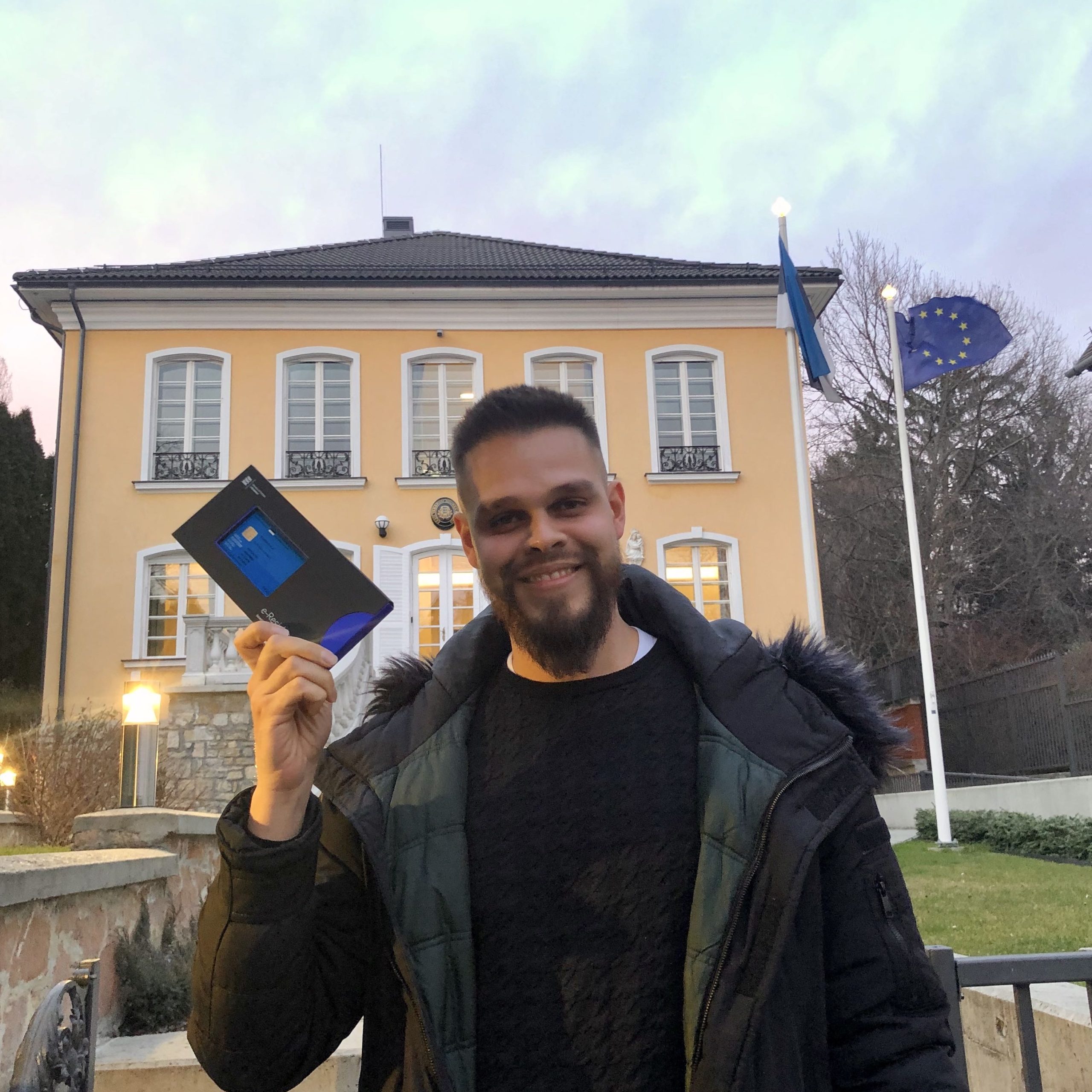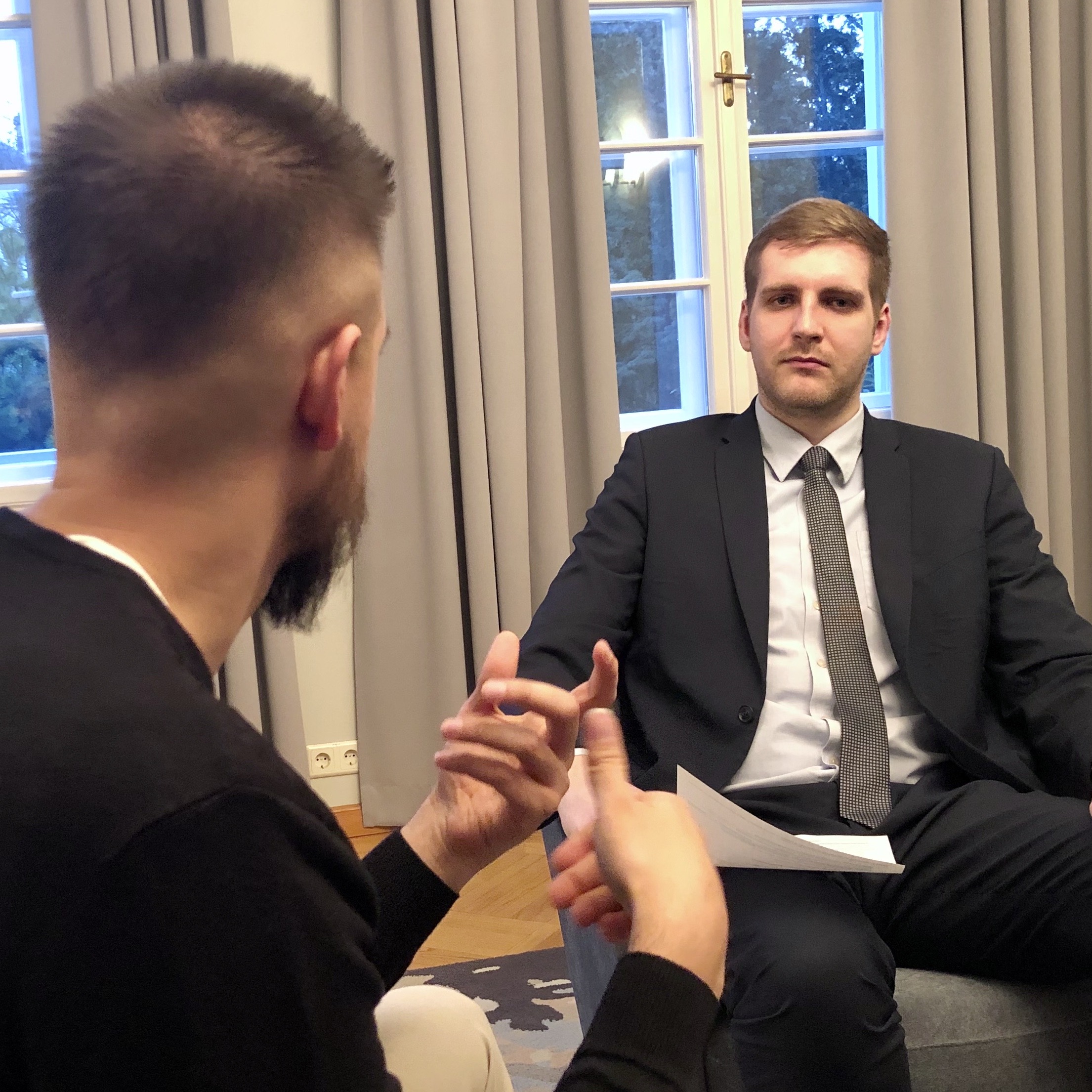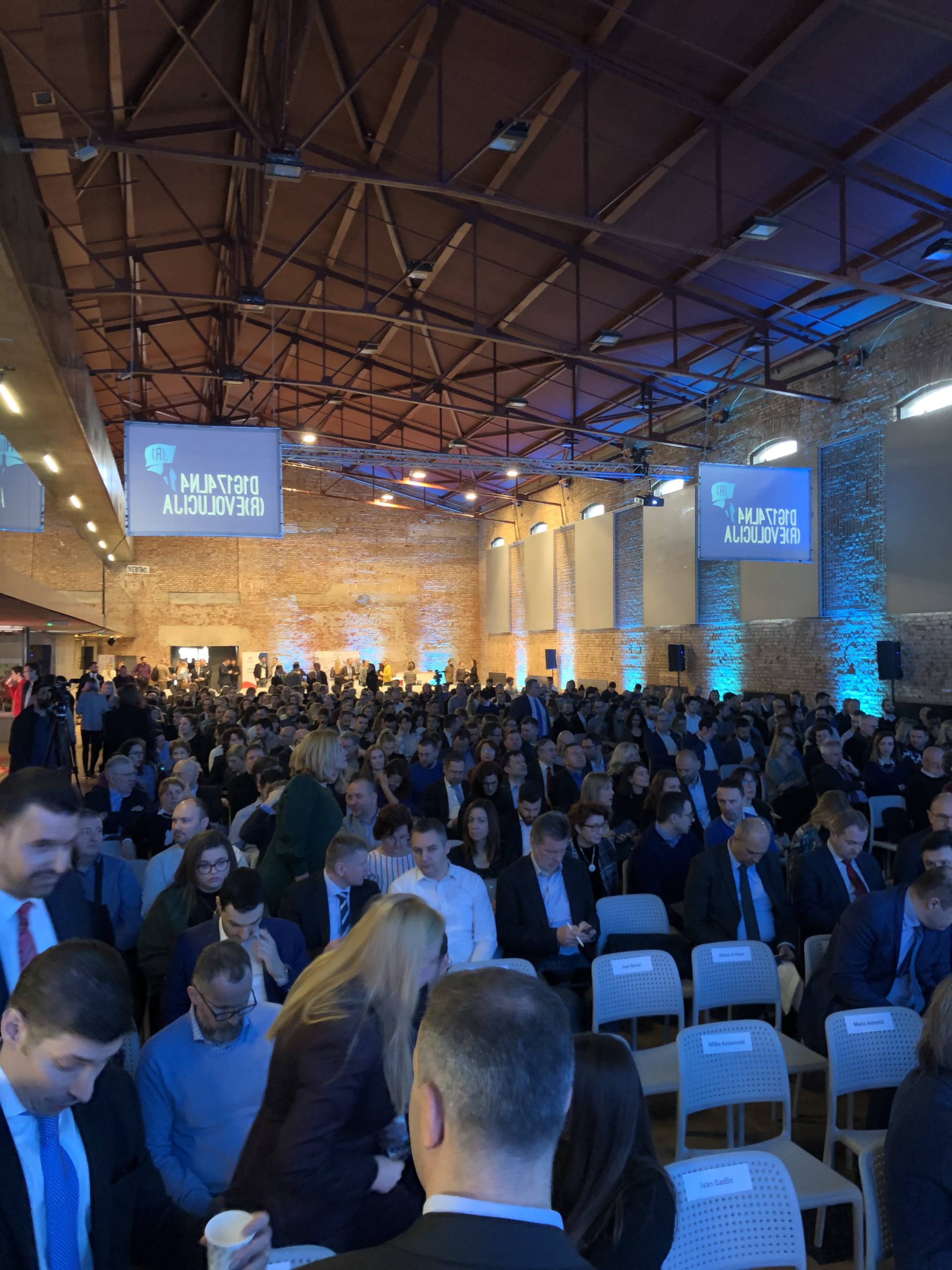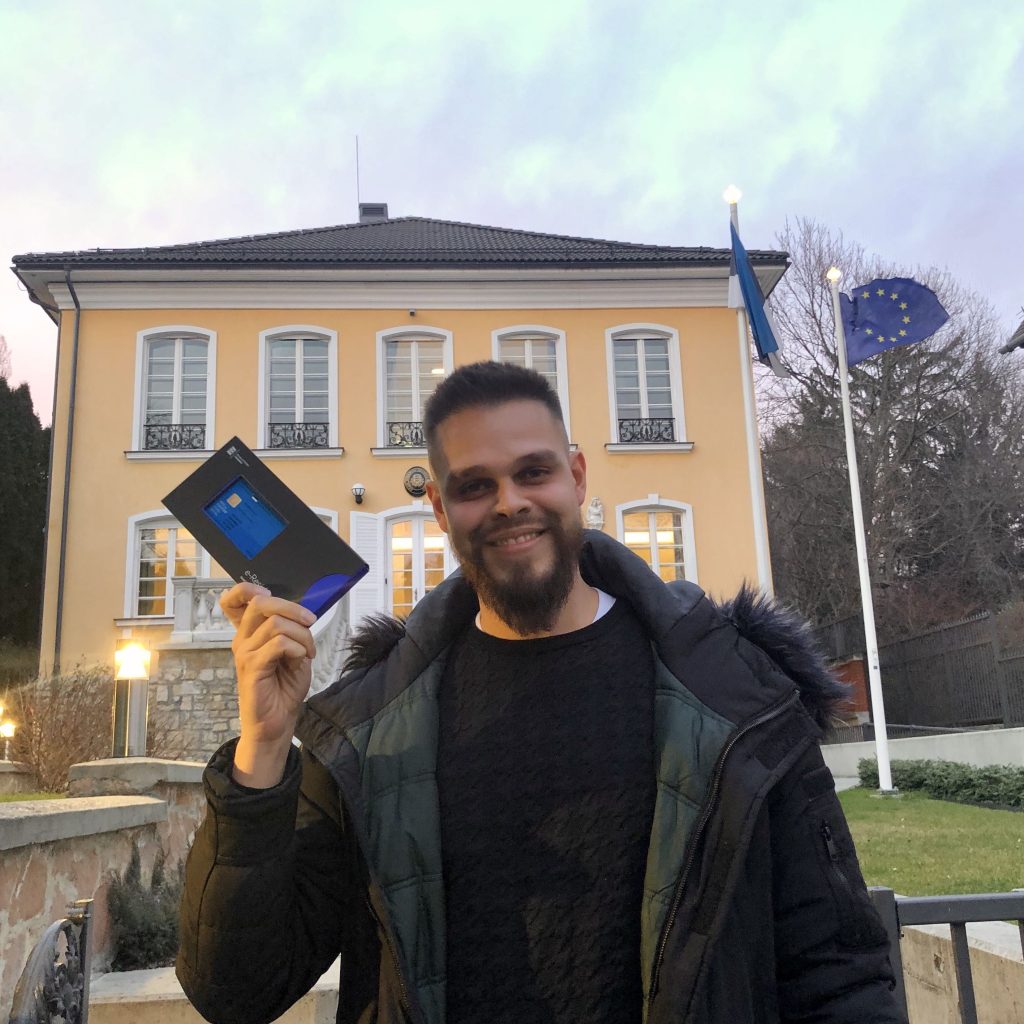February 14, 2020 – So what is a Venezuelan living in Varazdin doing travelling to Budapest to collect an e-residency from the Estonian Embassy? Meet a role model for e-Balkans.
There’s so much to say about Estonia. The Baltic nation is home to 1.3M citizens, and producing the highest amount of unicorns per capita (Bolt, TransferWise, Skype, and Playtech). It offers a comfortable 20% income tax flat-rate for private entrepreneurs and corporations, and last year 98% of its population declared their taxes electronically in less than 3 minutes.
Also, they started to implement Blockchain for hash-linked timestamps in their systems nine years ago. Yup! That’s 2011. For reference, that’s the year Steve Jobs died, and the then 3-year-old bitcoin closed at $4.72 on December 31st.
Today, however, we will focus on their e-residency program, launched in 2014 by the e-nation as part of their Country-as-a-Service plan.
Last Thursday, February 6th of 2020, I traveled to the Estonian Embassy to Hungary in Budapest, to receive my “e-residency kit” from the hands of the Consul Kenneth Kopammes.

The e-residency Kit includes a residency card (without profile picture) and a USB-card-reader. With it, I’ll be able to sign electronically and access any of the services available
The experience was eye-opening, and this although I was very aware that giving my digital prints and receiving my e-residency card would be the first and last time I’d need to visit any Estonian government building, physically.
To better understand my excitement and motivations, you first need to know that this 2020 is the 17th anniversary of my arrival to Europe. Also, that as of today, I still hold a Venezuelan passport, exclusively.
I left Venezuela in 2003, or better said, as soon as my age made it legally possible for me to migrate. Today, I’m a self-proclaimed “Citizen of the World” who lived, studied, and worked in Venezuela, Germany, France, Spain, Denmark, Malta, and Croatia, visiting an even more considerable amount of jurisdictions.
In short, you can consider me a Connoisseur of Bureaucracy, a Sommelier of Visas and Residencies, and a European Authority on the ancient art of requiring Stamps and Permits to earn a living.
With this in mind, picture my reaction as I learned there was a Schengen state of the European Union, allowing a Venezuelan to open a business online and in a few hours. First, I thought: “What am I missing?” and immediately after reading into it on their dedicated service portal, I knew: “I have to try it out!”
One needs to become accustomed to the digital state experience, even a Human-Computer interaction futurist like me. By the end of 2019, Estonia had 62,000 registered e-residents and 10,000 e-resident companies. I knew this, of course! Like I also knew that 99% of their state services are online, and regardless, although all the cards were on the table, it shocked me to learn about the Embassy’s staff count and the efficiency of their operations.
Here is the workforce I was expecting to see at the Embassy to complete the process of my e-residency and interviewing the Consul: Entrance staff, service-desk Staff, e-residency processing staff, PR staff, the Consul’s PA, and finally, the Consul.
The Staff I interacted with: The Consul.
And who opened the front door? You wonder. Who let you into the processing room? Who sat in front of you and typed on the Keyboard Gustavo?
Well, all doors are remote-controlled, that was easy. And like any other e-resident, I had an appointment previously confirmed via e-mail, so I was the only person in the room that day. The process took at most 3 minutes, a quick preview of the time I’ll need for tax declarations. And the person guiding me throughout the steps, with a broad smile, processing my data, and assisting me in scanning my fingerprints was Kenneth, the Consul, as he pointed out me when I asked him about the agreed interview ahead.

What an honour, I thought to myself, when I learned that Mr. Kenneth Kopammes and the Ambassador Mrs. Kristi Karelsohn operate the systems themselves. They welcome every visitor personally and hand over the e-residency kit to all new Estonian e-residents.
KK: “I tried to ask everyone what they will do with their e-residency and what their plans are. The vast majority want to open a business, and the other 1% are what we call “Estonian fans” or just people who would like to participate in something innovative.”
Admittedly I belong to that 1%. The Estonian is the most advanced digital society I’ve come across, and there’s much to learn from them. To run an embassy in such an efficient and human way, was unheard of to me, a real Country-as-a-Service. I don’t recall feeling higher respect towards any other government official, as I did that day.
I recommend you reading Paul Bradbury’s article on the “Rock Star” status the Croatian politicians enjoy: Would Croatia Be Better If Its Politicians Were Not Treated as Rock Stars?
Now, going back to the more practical reasons why I decided to open and run a company in Estonia while living in Croatia. The first and most important reason is the simplicity and transparency of their systems. By this, I mean the government and tax systems, not necessarily the ones in their computers. Without this, I certainly would not even consider it. I’m sure many of the other 60k e-residents share the same reason.
KK: “Last year, our Embassy gave out over 170 e-Residency cards, the vast majority of which to applicants from Hungary and the Western-Balkan countries. As our Embassy reopened at the end of 2018, many Croatian applicants received their e-Residency cards from other neighboring Estonian Embassies. People from Croatia interested in e-Residency are very much welcome to receive their cards from our Embassy in the future.”
My second reason is TO LEARN. I can read websites and watch YouTube videos, or I can try it out for myself, experience it, and participate by promoting what works. In short, I wish to gather as much experience as I can, aiming to help pave the way for the imminent e-Balkan revolution.
KK: “The Embassy tries to engage with our existing local e-Residents actively. For example, last November, we had two excellent events dedicated to the fifth anniversary of the e-Residency program.”
For more info about the community aspect of e-Residency, follow the links below:
Blog.
And the third reason is mobility. I’m a Self-proclaimed “Citizen of the world” and nomad (before the “digital-” prefix was a thing), remember?
KK: “One of the things that the system does not yet allow is to get married online. It affected me, personally, since I decided to marry my now wife after we moved here a year ago. To do that, we had to go back to Estonia three times!. Marriage is one of the few things that are not yet online, but it’s in the works!”
All information is available in simple and understandable English online, and I feel convinced that it is always up to date. Most foreigners need to jump through hops and fire rings to get any document sorted in Croatia. Opening a company is not nearly as easy as advertised, and it is much worse to run it.
In Croatia, I can rarely rely on any information given to me, be it online or in person. The information changes from person to person, and from office to office. The time of the day you ask, your appearance and looks, who their “Kum” is, and your ability to seem “simpatićno” are all potential influencing factors during the process. In the best cases, a Croatian government official will admit not to have the slightest clue (or interest) by asking you to “send an e-mail with your question” while you stand in front of them. The fact that 4M people need to invest hours, if not days (thanks to the very centralized systems) in getting to their offices for stamps and papers, seems to be insignificant to the Croatian state. #TrueStory
I’m so used to having to bring a Croatian defender (lawyer, or anyone wearing a suit and speaking the tongue) to assist me in getting things done, that I don’t even bother in translating and reading the information I receive any more. It’s more relevant to know how many friends my lawyer/representative has in MUP, Porezna Uprava, and Courts than actually understanding the principles and rules.
“But Gustavo, what if you learn Croatian!?” Yes, I hear you, I could, and I am learning Hrvatski out of pleasure. However, when it comes to my financial security and independence, I prefer to run a business online, in simple English, and without any geographical limitation. Time is Money, and time invested in enjoying my digital-nomad-family lifestyle, as opposed to trying to figure out the system and the emotional state of the many actors influencing it, is priceless.
As I wrote at the start, there’s so much to say about Estonia. So much to learn, try, compare, and analyze that I’ve decided to start a series of articles dedicated to it.
And based on the large attendance to HUP’s event last February 5th, 2020, “D1G174LN4 (R)EVOLUCIJA” celebrated in Lauba, Zagreb (image below) I’m sure we will be talking a lot about this topic this and the coming years.

Last January, Estonia passed a bill allowing digital nomads (or remote workers) to come to Estonia and work from there. Could that be something Croatia can replicate soon? Read more into the topic of Digital nomads in Paul’s article:
“How Croatia is Becoming Increasingly Attractive for the Digital Nomad Lifestyle”











